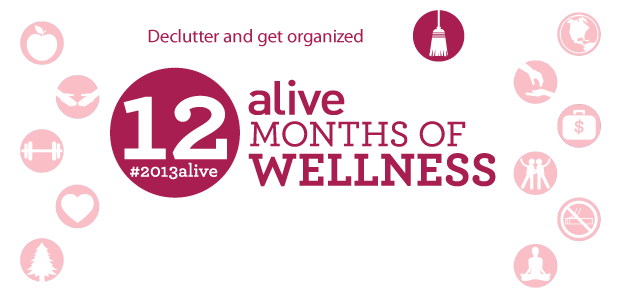Advertisement
12 Months of Wellness
Declutter and get organized

Welcome to May’s edition of the 12 Months of Wellness! We’re continuing our dedication to the previous months’ topics, but this month we’re adding May’s theme: decluttering and organizing.
The benefits of decluttering
Recent research has shown that a decluttered space can be a happier, healthier place for us. A 2011 study noted that in a scene with visual clutter, each object competes for attention, leaving us scatterbrained and less able to concentrate. But the truth is that we likely know intuitively that when our houses are tidy, we feel relaxed and stress-free. Staring at a pile of clutter, on the other hand, can make our heart rates rise.
Liz Voce, Toronto-based professional organizer and owner of Sort-It professional organizing, agrees: “The benefit of tackling clutter is that you feel lighter, like a weight has been lifted off your shoulders. You’re able to concentrate better and focus more on the tasks at hand.”
Kristie Demke, Edmonton-based professional organizer of Organomics Professional Organizing and past president of Professional Organizers in Canada, adds, “I think for most people, getting organized leads to a feeling of being more in control—both of themselves and their surroundings.”
An impossible ideal?
The 17th-century designer and artist William Morris once said, “Have nothing in your house that you do not know to be useful, or believe to be beautiful.” For many of us living in day-to-day clutter, this seems like a very far-fetched idea—but it doesn’t have to be. Once we do away with existing clutter and develop long-term systems for minimizing incoming clutter, the day-to-day work is very minimal.
And while it may be unrealistic to turn our living spaces into a scene from a home decor magazine, it’s definitely possible to organize our things, so we can feel calm—and find the car keys every morning.
According to Voce, “I always tell my clients that your home will likely not look like Martha Stewart’s; mine certainly doesn’t! It’s really about creating a space that you feel comfortable with, and that you can maintain … Although the media focuses on spectacularly neat and beautifully designed homes, they simply don’t look lived in.”
Rather than finding these images overwhelming, Demke suggests we find them inspirational: “The take away from such photos should be that less is more and that a clutter-free room unlittered with dishes, coats, homework, and laundry is much more pleasant and inviting.”
Drop us a line—online!
We want to know how your 2013 journey is going. Get online and tell us your experiences so far via blog comments on alive.com, Facebook comments, or by using the Twitter hashtag #2013alive.
Also be sure to check out our updates on Twitter (@aliveHealth), Facebook (facebook.com/alive.health.wellness), and blog posts on alive.com.
| Week 1: May 5 to 11 Start by sortingTackle clutter bit by bit using the “four-box method” The four-box method is one of the most popular ways to tackle clutter and sort it into designated sections. First, decide which room you’ll be tackling. Demke suggests asking ourselves how we want to use this room; this will define the area and keep us on track.
Tackle the job bit by bit all week long, even if it’s only in 15-minute intervals. Try to make decisions quickly, and when you’re done, avoid going through the trash or donate/sell box; this will prevent second thoughts. According to Voce, when deciding what to keep, “You really want to ask yourself, is it useful? Have I used this in the last year? Do I need it? Do I love it? If the answer is no, then let it go.” Here’s a quick trick to use when an object stumps you, and you just can’t imagine getting rid of it: the “expiration date box.” Put the object in a box with an expiration date on it—if you don’t open the box to use the object by its expiration date, donate or sell it. |
Get happy, get organized giveaway
Don’t forget to enter to win our Get Happy, Get Organized giveaway, packed with essentials to get your home (and life!) back in order. To see what’s included and to enter for your chance to win, visit alive.com/contests.
| Week 2: May 12 to 18 Say goodbye to unwanted itemsGet the clutter out of sight—and mind Weeks 2 and 3 focus on taking care of the containers you’ve filled while sorting. Dealing with the items in the put-away and trash containers is easy, but the other ones are a bit more challenging. This week, we focus on the donate/sell container. Have a garage sale Garage sales are great for clearing out clutter, but be realistic: if you know your boxes of accumulated things will sit around creating more clutter while you find time to organize a sale, consider other options instead. Give away Think of people in your life who may be interested in the items. Do you have a nephew who is moving out on his own for the first time and could use some small kitchen appliances? Perhaps your neighbours’ children might appreciate the toys your kids have outgrown? Donate Use a community guide or the internet, or ask around to find a charity or organization near you that will accept donations of gently used items. Women’s shelters, children’s programs, animal shelters, and thrift stores are all good places to check. Demke suggests checking out your city’s or municipality’s website, which often lists charities in need. |
Spic and span, naturally
Your cleaning products may have some dirty secrets. The Environmental Working Group (EWG) recently analyzed common cleaning products such as air fresheners, all-purpose cleaners, detergents, and bathroom cleaners, and found that many
- contain harsh irritants to skin and lungs
- can be dangerous or fatal if ingested
- emit toxic fumes
- are harmful to the environment
- are potential endocrine (hormonal) disruptors
- contain potential or known human carcinogens
Safer options can be found at natural health retailers. Check out the EWG’s Guide to Healthy Cleaning (ewg.org/guides/cleaners) to rate your current brand and find alternatives.
| Week 3: May 19 to 25 Keep track of your treasuresCreate storage solutions Now it’s time to tackle your storage pile. “Clutter is really only homeless items,” says Demke, “so deciding where they live is key!”
|
Extra credit organizing!
alive’s 12 Months of Wellness is all about making goals realistic, and sometimes that means tweaking things to fit your unique desires, goals, or situation. Mix and match to create your May game plan (or earn some extra credit marks!) by considering the following:
- If the clutter in your wallet or purse is weighing you down—literally—give it a revamp: make use of pouches and pockets, toss old membership cards, and clear out excess coins.
- Fridge and pantry looking a little scary? Discard expired items, donate items you won’t use, and give the shelves a little elbow grease.
- Don’t wait until you’re sick to rummage through your medicine and supplement cabinet. Get rid of old products, make an inventory of what you need, and take a trip to the health food store to stock up.
| Week 4: May 26 to June 1 Reduce incoming clutterLess future clutter means less future stress and effort Following these tips will lead to less clutter in the long term.
|
Are you a clutterbug?
Although there may not be a scientific diagnostic test, you may be a clutterbug if you answer “yes” to the following questions:
- Do you try to organize and then get frustrated or overwhelmed and give up?
- Do you feel that you don’t have enough space to store all your things?
- Do you lose important items on a regular basis?
- Do you re-purchase items because you aren’t able to find them?
If you’re interested in getting help from a professional organizer, check out the “Find an Organizer” directory at the Professional Organizers in Canada website, organizersincanada.com, which lists organizers by city.
However, keep in mind that while clutter can be normal, hoarding is not. Hoarding causes more than just frustration and inconvenience; it is a psychiatric condition that can lead to serious safety and hygiene issues with dangerous consequences. If you feel that you may be a hoarder, it’s best to seek professional help in the form of specialized psychological support.





